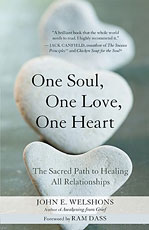John Welshons is a highly respected contemporary spiritual teacher who has been a practitioner of mindfulness and various forms of yoga for more than 40 years. He also lectures and leads courses on meditation throughout America. He begins this illuminating and profound work on the spiritual nature of relationships with a quotation from Meher Baba: "It is for love that the whole universe sprang into existence, and it is for the sake of love that it is kept going." Then in the foreword, Ram Dass commends Welshons for showing us how we can "use relationships as stepping-stones on our spiritual path."
Relationships are the central source of meaning and miracles in our lives. They are the arena in which we exercise our values and express our visions. Welshons signals their importance when he observes that they offer two opportunities: "The opportunity to experience unparalleled love and joy, and the opportunity to see how our judging mind often blocks our ability to experience that love and joy." While the culture emphasizes pursuits which provide pleasure but keep us isolated from each other, those on a spiritual path relish fresh opportunities to connect with others and to dive deep into the ocean of Oneness. Welshons makes a link between mindfulness and having good manners. Meditation trains us to pay attention to others and to sense the presence in the world of others besides "me." Empathy is another spiritual practice that enriches our lives and those of the people around us.
The author's mentor, Ram Dass, was told by his guru Neem Karoli Baba to "Feed people, love people, serve people." They worked together on the Seva Foundation which enabled them to connect with others through giving. Welchons cautions that although there is great fulfillment in service, we must still be on guard against what the Buddhists call the Five Hindrances (lust and greed, hatred and ill will, agitation, sloth and torpor, and doubt). He proceeds to a wide-ranging discussion of our relationships with our souls; our bodies; our mind and personalities; our parents; our siblings, friends, community, and nature; our lovers and mates; our children; and our God. Along the way, the author probes embracing aging, romance and karma, active listening, the importance of education, and high teachings from our adversaries. By the end of the book, we feel that we have been treated to a deeper and richer appreciation of the spiritual nature of our relationships.
